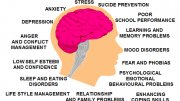 Everyone has off days when they just don't feel like themselves. For the majority of people, these feelings are normal, and they don't last long at all. For some, however, these feelings are more serious, and they could indicate a mental or emotional problem.
Everyone has off days when they just don't feel like themselves. For the majority of people, these feelings are normal, and they don't last long at all. For some, however, these feelings are more serious, and they could indicate a mental or emotional problem.
Clinical psychology is a broad branch of psychology that focuses on diagnosing and treating mental, emotional, and behavioral disorders. Some of the more common disorders that might be treated include learning disabilities, substance abuse, depression, anxiety, and eating disorders.
The field of psychology became more recognized during the second half of the 19th century, although clinical psychology wasn't recognized until the end of the 19th century. It was around this time that Lightner Witmer first helped treat a boy with a learning disability. In 1896, Witmer opened the first psychology clinic, which catered to children with disabilities. In 1907, he coined the phrase "clinical psychology" in his new psychology journal, called The Psychology Clinic.
Although his ideas were somewhat slow to catch on, Witmer is now credited with being one of the founding fathers of clinical psychology. His progress in treating that one child helped pave the way for the future of clinical psychology.
What are the Education Requirements to Become a Clinical Psychologist?
As with all other psychology careers, becoming a clinical psychologist requires extensive training and education. In order to start a clinical psychology career, individuals will typically need to earn a Bachelor's in psychology or clinical psychology.
Additional schooling is also usually necessary after the four year degree. This typically includes earning a Master's degree and Doctoral degree in clinical psychology. To learn more about the available colleges for these programs in your area visit our Find a School Page.
Spotlight Clinical Psychology Degree Offerings
What Does a Clinical Psychologist do?
Individuals pursuing clinical psychology careers will often have the choice of practicing general clinical psychology or focusing specifically on certain types of patients or disorders. For example, a clinical psychologist might focus on working with children or the elderly, or they might focus on working only with patients who are diagnosed with eating disorders or post-traumatic stress disorder.
Simply put, a clinical psychologist has three main duties:
1. Assess the patient
2. Diagnose disorders
3. Recommend a possible treatment
Assessing a patient typically involves speaking with and interviewing him and possibly his loved ones. During these interviews, a clinical psychologist will often learn a great deal about what's troubling his patients. The most common way for a clinical psychologist to gather information about a patient is by observing him and his actions. A patient himself or his loved ones will also be able to offer some insight as to how he acts, and what his thoughts and feelings are.
Once a clinical psychologist has assessed a patient, he will then usually diagnose him. In order to do this, the psychologist will study any information, such as unusual thoughts and behaviors. The
Diagnostic and Statistical Manual of Mental Disorders (DSM-IV-R) can then be used to help diagnose a patient according to his specific symptoms.
Source: careersinpsychology.org
You might also like:
















If psychologists are confused about their obligations, what they need is not more information, but an ethics-based model for organizing and using the information they already have. If psychologists are having difficulty seeing the ethical forest for the legal trees, what they need is not more legal training, but clearer ethics-based training. !